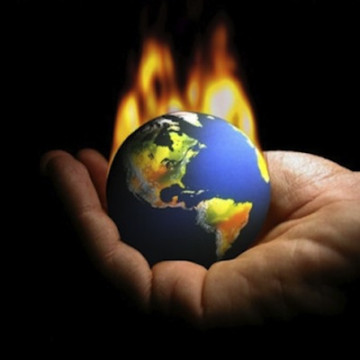Horowitz: United Nations Sounds Alarm on the Climate
Tuesday, December 03, 2019
This year’s United Nations Emissions Gap Report details the yawning gap between what nations have committed to do and are doing under the Paris Climate agreement and what is needed to avoid the worst consequences of global warming.
Released in advance of a UN-sponsored meeting in Madrid this week and next, aimed at ensuring implementation of the Paris agreement, the gap report clarifies the difficulties created by the fact that despite many positive steps, we have yet to begin reducing greenhouse gas emissions: "Had serious climate action begun in 2010, the cuts required per year to meet the projected emissions levels for 2°C and 1.5°C would only have been 0.7 percent and 3.3 percent per year on average. However, since this did not happen, the required cuts in emissions are now 2.7 percent per year from 2020 for the 2°C goal and 7.6 percent per year on average for the 1.5°C goal. Evidently, greater cuts will be required the longer that action is delayed.”
The goal of getting well below a 2°C or 3.6°F increase over pre-industrial levels agreed to in Paris reflects the consensus of scientists that limiting average global temperature increases to this range will enable the world to limit the impacts of climate change to manageable ones. As the gap report outlines, our window of opportunity for doing so is rapidly closing.
GET THE LATEST BREAKING NEWS HERE -- SIGN UP FOR GOLOCAL FREE DAILY EBLASTBut as the gap report points out, the opportunity is still before us and there are positive developments upon which to build. At the recent UN Climate Action Summit, more than 70 countries and more than 100 cities, for example, set a goal of zero net carbon emissions by 2050. Perhaps even more consequential, “more than 100 leaders in the private sector committed to accelerating the green economy. A group of the world’s largest asset-owners, controlling $2 trillion, pledged to move to carbon-neutral investment portfolios by 2050. This is in addition to a recent call by asset managers representing nearly half the world’s invested capital, some $34 trillion, for global leaders to put a meaningful price on carbon and phase out fossil fuel subsidies and thermal coal power worldwide.”
Attempting to create a virtuous cycle of stepped-up commitments, the Paris agreement includes a provision for nations to reaffirm and upgrade their commitments every 5 years, beginning in 2025. It will be a key to get a critical mass of nations to commit to take far more action to reduce their greenhouse gas emissions at this point or before. Given the dramatic reductions in the cost of renewable energy, such as solar and wind, this is achievable.
Speeding the transition from a world economy all too dependent on fossil fuels to one that mainly runs on renewable non-carbon producing energy sources, however, requires American leadership--leadership that has been missing under President Trump who has formally declared his intention to withdraw from the Paris agreement and has been working to reverse the Obama Administration actions to curb climate change. These serious actions at home put in place by President Obama are precisely what gave the United States credibility around the world to advance an agenda aimed at solving the climate challenge.
It was American leadership that forged the landmark Paris agreement in the first place, convincing developing nations such as China and India, who had previously resisted making significant commitments on reducing greenhouse gas emissions, to take action. They had previously argued that Western nations whose economies developed earlier had created the problem and should solve it on their own, At this crucial time for the climate, despite the admirable efforts of many of our state and local elected leaders and of some of our most prominent business leaders and philanthropists to fill the vacuum, the United States is largely missing in action.
Either an unlikely mid-course correction by the Trump Administration or the election of a new president committed to take on the climate challenge at home and abroad is essential to leaving our children with a planet that can supply the same quality of life we have all been able to enjoy, There is nothing less at stake.
Rob Horowitz is a strategic and communications consultant who provides general consulting, public relations, direct mail services and polling for national and state issue organizations, various non-profits, businesses, and elected officials and candidates. He is an Adjunct Professor of Political Science at the University of Rhode Island.
Related Articles
- Horowitz: A Tale of Two Presidencies on the Environment
- Horowitz: The Iran Mess - Paying the Price for Trump’s Incoherent Foreign Policy
- Horowitz: Trump Amps Up the Racism
- Horowitz: Alarm Bells Ring on Russian Election Interference
- Horowitz: Second Round of Democratic Debates Clarified Very Little
- Horowitz: Biden Debate Performance - Yellow Caution Flag
- Horowitz: Trump Refuses to Shut the Door on Foreign Interference in Our Elections
- Horowitz: Courageous GOP Congressman Talks About What is Actually in Mueller Report
- Horowitz: Neighborhood Gathering Places Build Trust & Social Connection
- Horowitz: Mueller Speaks
- Horowitz: The American Public Believes that Made-up News is a Big Problem
- Horowitz: It’s Time to Take on Assault Weapons & High Capacity Magazines
- Horowitz: California Out-Maneuvers Trump Administration on Climate
- Horowitz: Getting al-Bhaghdadi is Great; But No Substitute for a Coherent Policy
- Horowitz: High Trust in Principals, Police & the Military—-Not Congress or Tech Executives
- Horowitz: Senate Republicans Calibrate on Impeachment
- Horowitz: Twitter Provides a Distorted Window into American Public Opinion
- Horowitz: We Should All be Thankful for Public Servants like Yovonavich, Taylor & Kent
- Horowitz: Wheels Are Off at 1600 Pennsylvania Avenue
- Horowitz: Some Republicans & Trump Supporters Speak Out
- Horowitz: Sharpie-Gate
- Horowitz: Shutting the Door on Bahamian Hurricane Victims
- Horowitz: The World’s Youth Send Strong Message on the Climate
- Horowitz: Trump’s Actions on Ukraine Earn Him an Impeachment Inquiry




